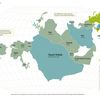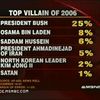11.8.2008 | 13:32
Smį upprifjanir
“I am saddened that it is politically inconvenient to acknowledge
what everyone knows: the Iraq war is largely about oil.”
Alan Greenspan, Chairman Of The US Federal Reserve 1987 - 2006
Sunday Times, 16 September 2007
"The shortage of oil and natural gas, relative to demand, had already changed the balance of world power. Historians may well conclude that the US decision to invade Iraq was primarily motivated by the desire to gain physical control of Iraq’s oil and to provide defence support to other Middle Eastern oil powers. "
Lord William Rees-Mogg
Are these the last days of the Oil Age?
London Times, 16 July 2007
"The Bush Administration began making plans for an invasion of Iraq, including the use of American troops, within days of President Bush's inauguration in January of 2001 -- not eight months later after the 9/11 attacks, as has been previously reported. That's what former Treasury Secretary Paul O'Neill says in his first interview about his time as a White House insider.... In the book, O'Neill is quoted as saying he was surprised that no one in a National Security Council meeting questioned why Iraq should be invaded. 'It was all about finding a way to do it. That was the tone of it. The president saying 'Go find me a way to do this,' says O'Neill in the book.... "
Saddam Ouster Planned Early '01?
CBS News, 10 January 2004
"Many adults in the United States believe the current federal government has not been completely forthcoming on the issue of the 9/11 terrorist attacks, according to a poll by the New York Times and CBS News.... Only 16 per cent of respondents say the government headed by U.S. president George W. Bush is telling the truth on what it knew prior to the terrorist attacks, down five points since May 2002."
Americans Question Bush on 9/11 Intelligence
Angus Reid Global Monitor : Polls & Research, 14 October 2006
Over 100 Professors Question The Validity Of The Official 9/11 Report
Over 100 Senior Military, Intelligence, Law Enforcement, and Government Officials Question
9/11 Commission Report
Key Witnesses Blatantly 'Overlooked' In Official Cover-Up Of 9/11 Money Trail
The Silence Of George Tenet - 911 And The Israeli-Russian Connection
"Former House Speaker [and Republican] Newt Gingrich said Thursday the Bush administration is waging a 'phony war' on terrorism, warning that the country is losing ground against the kind of Islamic radicals who attacked the country on Sept. 11, 2001. A more effective approach, said Gingrich, would begin with a national energy strategy aimed at weaning the country from its reliance on imported oil...."
Gingrich says war on terror 'phony'
The Atlanta Journal-Constitution, 3 August 2007
".... the so-called 'war on terrorism' is being used largely as bogus cover for achieving wider US strategic geopolitical objectives..... 9/11 offered an extremely convenient pretext to put the PNAC plan into action. The evidence again is quite clear that plans for military action against Afghanistan and Iraq were in hand well before 9/11..... the PNAC blueprint of September 2000 states that the process of transforming the US into 'tomorrow's dominant force' is likely to be a long one in the absence of 'some catastrophic and catalyzing event - like a new Pearl Harbor'. The 9/11 attacks allowed the US to press the 'go' button for a strategy in accordance with the PNAC agenda which it would otherwise have been politically impossible to implement. The overriding motivation for this political smokescreen is that the US and the UK are beginning to run out of secure hydrocarbon energy supplies. By 2010 the Muslim world will control as much as 60% of the world's oil production and, even more importantly, 95% of remaining global oil export capacity. As demand is increasing, so supply is decreasing, continually since the 1960s..... the 'global war on terrorism' has the hallmarks of a political myth propagated to pave the way for a wholly different agenda - the US goal of world hegemony, built around securing by force command over the oil supplies required to drive the whole project."
Michael Meacher MP, UK environment minister from May 1997 to June 2003
This war on terrorism is bogus
Guardian, 6 September 2003
BBC, March 2005 - Bush Administration Made Plans For War And Iraq's Oil Before 9/11 Attacks
Um bloggiš
Baldur Fjölnisson
Nżjustu fęrslur
- Torfi Stefįns bannašur ęvilangt
- OL ķ skįk. Landinn malaši Kenķu ķ 9. umferš
- OL ķ skįk: Landinn ķ 88. sęti eftir 8 umferšir
- Mešaljónar ķ skįkinni
- Baggalśtur - Sagan af Jesśsi
- Eitraš fyrir lżšnum?
- Óvenjulega döpur taflmennska innfęddra einkennir Reyjavķkursk...
- U.S. Rushes Coolant to Japanese Nuke Plant After Earthquake
Heimsóknir
Flettingar
- Ķ dag (18.9.): 0
- Sl. sólarhring: 1
- Sl. viku: 8
- Frį upphafi: 0
Annaš
- Innlit ķ dag: 0
- Innlit sl. viku: 7
- Gestir ķ dag: 0
- IP-tölur ķ dag: 0
Uppfęrt į 3 mķn. fresti.
Skżringar
Bloggvinir
-
 Agný
Agný
-
 Alfreð Símonarson
Alfreð Símonarson
-
 Andrea J. Ólafsdóttir
Andrea J. Ólafsdóttir
-
 Bjarni Harðarson
Bjarni Harðarson
-
 Bjarni Kjartansson
Bjarni Kjartansson
-
 Björgvin Gunnarsson
Björgvin Gunnarsson
-
 Brynjar Jóhannsson
Brynjar Jóhannsson
-
 FLÓTTAMAÐURINN
FLÓTTAMAÐURINN
-
 Eygló Þóra Harðardóttir
Eygló Þóra Harðardóttir
-
 FreedomFries
FreedomFries
-
 Fríða Eyland
Fríða Eyland
-
 Félag um stafrænt frelsi á Íslandi
Félag um stafrænt frelsi á Íslandi
-
 Georg P Sveinbjörnsson
Georg P Sveinbjörnsson
-
 Gestur Guðjónsson
Gestur Guðjónsson
-
 Gils N. Eggerz
Gils N. Eggerz
-
 Gullvagninn
Gullvagninn
-
 Gunnar Skúli Ármannsson
Gunnar Skúli Ármannsson
-
 Guðrún María Óskarsdóttir.
Guðrún María Óskarsdóttir.
-
 Gísli Hjálmar
Gísli Hjálmar
-
 Hagbarður
Hagbarður
-
 Halla Rut
Halla Rut
-
 Haraldur Haraldsson
Haraldur Haraldsson
-
 Hilmar Kári Hallbjörnsson
Hilmar Kári Hallbjörnsson
-
 Hlekkur
Hlekkur
-
 Ingibjörg Álfrós Björnsdóttir
Ingibjörg Álfrós Björnsdóttir
-
 Jens Guð
Jens Guð
-
 Jóhannes Ragnarsson
Jóhannes Ragnarsson
-
 Jón Aðalsteinn Jónsson
Jón Aðalsteinn Jónsson
-
 Jón Ragnarsson
Jón Ragnarsson
-
 Jón Steinar Ragnarsson
Jón Steinar Ragnarsson
-
 Jónína Benediktsdóttir
Jónína Benediktsdóttir
-
 Karl Tómasson
Karl Tómasson
-
 Kári Magnússon
Kári Magnússon
-
 Loopman
Loopman
-
 Magnús Þór Hafsteinsson
Magnús Þór Hafsteinsson
-
 Promotor Fidei
Promotor Fidei
-
 Rúnar Sveinbjörnsson
Rúnar Sveinbjörnsson
-
 Salvör Kristjana Gissurardóttir
Salvör Kristjana Gissurardóttir
-
 Sandra María Sigurðardóttir
Sandra María Sigurðardóttir
-
 SeeingRed
SeeingRed
-
 Sigurbjörn Friðriksson
Sigurbjörn Friðriksson
-
 Sigurjón Þórðarson
Sigurjón Þórðarson
-
 Sigurður Þórðarson
Sigurður Þórðarson
-
 Snorri Hrafn Guðmundsson
Snorri Hrafn Guðmundsson
-
 el-Toro
el-Toro
-
 Sveinn Ingi Lýðsson
Sveinn Ingi Lýðsson
-
 Tryggvi Hjaltason
Tryggvi Hjaltason
-
 TómasHa
TómasHa
-
 Túrilla
Túrilla
-
 Upprétti Apinn
Upprétti Apinn
-
 gudni.is
gudni.is
-
 haraldurhar
haraldurhar
-
 proletariat
proletariat
-
 Ívar Pálsson
Ívar Pálsson
-
 Ómar Ragnarsson
Ómar Ragnarsson
-
 Ónefnd
Ónefnd
-
 Óskar
Óskar
-
 Óskar Helgi Helgason
Óskar Helgi Helgason
-
 Óskar Þ. G. Eiríksson
Óskar Þ. G. Eiríksson
-
 Þórir Kjartansson
Þórir Kjartansson
-
 Arnar Guðmundsson
Arnar Guðmundsson
-
 Bara Steini
Bara Steini
-
 Birgir R.
Birgir R.
-
 Birgir Rúnar Sæmundsson
Birgir Rúnar Sæmundsson
-
 brahim
brahim
-
 Brosveitan - Pétur Reynisson
Brosveitan - Pétur Reynisson
-
 Bwahahaha...
Bwahahaha...
-
 Dingli
Dingli
-
 eysi
eysi
-
 Gestur Kristmundsson
Gestur Kristmundsson
-
 Guðbjörg Elín Heiðarsdóttir
Guðbjörg Elín Heiðarsdóttir
-
 Gunnar Helgi Eysteinsson
Gunnar Helgi Eysteinsson
-
 Gunnar Rögnvaldsson
Gunnar Rögnvaldsson
-
 Helgi Jóhann Hauksson
Helgi Jóhann Hauksson
-
 Hlini Melsteð Jóngeirsson
Hlini Melsteð Jóngeirsson
-
 Jakobína Ingunn Ólafsdóttir
Jakobína Ingunn Ólafsdóttir
-
 Katrín Snæhólm Baldursdóttir
Katrín Snæhólm Baldursdóttir
-
 kreppukallinn
kreppukallinn
-
 Kristín Magdalena Ágústsdóttir
Kristín Magdalena Ágústsdóttir
-
 Máni Ragnar Svansson
Máni Ragnar Svansson
-
 Morgunblaðið
Morgunblaðið
-
 Neo
Neo
-
 Orgar
Orgar
-
 Ragnar L Benediktsson
Ragnar L Benediktsson
-
 Rauði Oktober
Rauði Oktober
-
 Skákfélagið Goðinn
Skákfélagið Goðinn
-
 Sveinn Þór Hrafnsson
Sveinn Þór Hrafnsson
-
 Vilhjálmur Árnason
Vilhjálmur Árnason
-
 Þór Ludwig Stiefel TORA
Þór Ludwig Stiefel TORA




Athugasemdir
"For the world as a whole, oil companies are expected to keep finding and developing enough oil to offset our seventy one million plus barrel a day of oil depletion, but also to meet new demand. By some estimates there will be an average of two per cent annual growth in global oil demand over the years ahead along with conservatively a three per cent natural decline in production from existing reserves. That means by 2010 we will need on the order of an additional fifty million barrels a day. So where is the oil going to come from? Governments and the national oil companies are obviously in control of about ninety per cent of the assets. Oil remains fundamentally a government business. While many regions of the world offer great oil opportunities, the Middle East with two thirds of the world's oil and the lowest cost, is still where the prize ultimately lies, even though companies are anxious for greater access there, progress continues to be slow."
Dick Cheney, Chief Executive of Halliburton, now Vice President of the United States
Speech at London Institute of Petroleum, Autumn Lunch 1999
Ex-CIA Chief Predicted 'Peak' Oil Crisis In 1999 CFR Paper
"In a world of looming shortage, Iraq represented a unique opportunity. With 115bn barrels, it had the world's third biggest reserves, and after years of war and sanctions they were the most underexploited. In the late 1990s, production averaged about 2m barrels, but with the necessary investment its reserves could support three times that..... Cheney knew, fretting about global oil depletion in a speech in London the following year, where he noted that 'the Middle East with two thirds of the world's oil and lowest cost is still where the prize ultimately lies'. Blair too had reason to be anxious: British North Sea output had peaked in 1999, while the petrol protests of 2000 had made the importance of maintaining the fuel supply excruciatingly obvious. Britain's and the US's fears were secretly formalised during the planning for Iraq. It is widely accepted that Blair's commitment to support the attack dates back to his summit with Bush in Texas in April 2002. What is less well known is that at the same summit, Blair proposed and Bush agreed to set up the US-UK Energy Dialogue, a permanent liaison dedicated to 'energy security and diversity'. Its existence was only later exposed through a freedom of information inquiry. Both governments refuse to release minutes of Dialogue meetings, but one paper dated February 2003 notes that to meet projected demand, oil production in the Middle East would have to double by 2030 to more than 50m barrels a day. So on the eve of the invasion, UK and US officials were discussing how to raise production from the region - and we are invited to believe this is coincidence. The bitterest irony is, of course, that the invasion has created conditions that guarantee oil production will remain hobbled for years to come, bringing the global oil peak that much closer. So if that was plan A, what on earth is plan B?"
The real casus belli: peak oil
Guardian, 26 June 2007
"Fuel is our economic lifeblood. The price of oil can be the difference between recession and recovery. The western world is import dependent. ....So: who develops oil and gas, what the new potential sources of supply are, is a vital strategic question...The Middle East, we focus on naturally."
Prime Minister's speech at the George Bush Senior Presidential Library, Texas
10 Downing St, Press Release, 7 April 2002
AFTER THE INVASION OF IRAQ
"The UK is a net exporter of oil, so we have no need of the Iraqi oil."
British Prime Minister, House of Commons, 14 April 2003
BEFORE THE INVASION OF IRAQ
".... our energy system faces new challenges.... Our energy supplies will increasingly depend on imported gas and oil..... we need access to a wide range of energy sources."
British Prime Minister, Foreword to DTI Energy White Paper, February 2003
Baldur Fjölnisson, 11.8.2008 kl. 13:35
Bęta viš athugasemd [Innskrįning]
Ekki er lengur hęgt aš skrifa athugasemdir viš fęrsluna, žar sem tķmamörk į athugasemdir eru lišin.